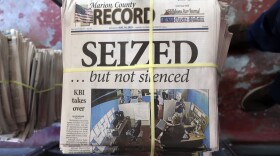LEILA FADEL, HOST:
Despite a police raid and the death of its owner, the Marion County Record published today as usual. Police seized computers at the small-town Kansas newspaper last week in a move that's been widely criticized as a potential First Amendment violation. Rose Conlon of member station KMUW and the Kansas News Service reports from Marion.
(SOUNDBITE OF PHONE RINGING)
CHERI BENTZ: Marion County Record. This is Cheri. May I help you?
ROSE CONLON, BYLINE: It was hectic all day at the Marion County Record as the seven-person staff rushed to meet its midnight deadline to send the paper to print. Much of what they needed is held on servers and hard drives that remain in police custody after Friday's raid of the office and publisher Eric Meyer's house. So they scrambled to reconstruct pages of the newspaper and iron out details in their own reporting on the story that's thrust this central Kansas town of around 2,000 people into the national spotlight.
BENTZ: We're having to recreate legals, classifieds. All of our normal things that we have readily available on that server is gone.
CONLON: Cheri Bentz, the paper's office manager, fielded a deluge of calls - community members asking how they can help, reporters seeking interviews and people from across the country voicing their support. Bentz says the paper has gotten over 1,500 new digital subscribers. On Tuesday, several people stopped by the office in person to subscribe.
UNIDENTIFIED PERSON #1: Thank you so much.
UNIDENTIFIED PERSON #2: Did you get a subscription?
UNIDENTIFIED PERSON #3: I did.
UNIDENTIFIED PERSON #2: So did we. Are you from Kansas City?
UNIDENTIFIED PERSON #3: I'm from Phoenix.
CONLON: Around mid-morning, staff got a temporary server set up so they could access their emails for the first time in days. They were able to use some older computers to work on the week's paper. Sports reporter Nicholas Kimball said it was slow going.
NICHOLAS KIMBALL: Everything was on those computers. And so Eric's basically having to rebuild the template that was going to go out for this week, redownloading software programs so we can start working again.
CONLON: The raid appears to have stemmed from a dispute with a local restaurant owner over a drunk-driving conviction. The Marion County Police Department, which had a search warrant but not a subpoena, typically sought to seize journalists' materials, has said the raid was justified. Emily Bradbury, executive director of the Kansas Press Association, stopped by the newsroom to help answer calls. She worries the seizure could set a dangerous precedent.
EMILY BRADBURY: I'm hearing from journalists across the state saying, wait a minute, I get tips all the time, and I use public databases to look up information all the time, so does that mean they can come and take my entire computer?
CONLON: Meantime, attorney Bernie Rhodes, who represents the paper, is deciding what legal steps to take.
BERNIE RHODES: The damage has already occurred. I can't stop that, but I can try to send a message loud and clear. It won't be tolerated in the future.
CONLON: Outside the paper's building, people have left flowers in memory of Joann Meyer, the co-owner of the Marion County Record. The 98-year-old died on Saturday, a day after police raided her home. The coroner's report listed the cause as sudden cardiac arrest. Publisher Eric Meyer says he believes stress from the raid played a role in his mother's death. Her funeral will be held Saturday. And now that this week's paper is in newsstands, its reporters say they'll turn their attention to next week's edition and fight to get their equipment back.
For NPR News, I'm Rose Conlon in Marion. Transcript provided by NPR, Copyright NPR.
NPR transcripts are created on a rush deadline by an NPR contractor. This text may not be in its final form and may be updated or revised in the future. Accuracy and availability may vary. The authoritative record of NPR’s programming is the audio record.






